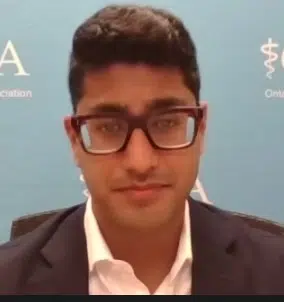
Dr. Adam Kassam
Ontario’s doctors have released an action plan to address health-care challenges in northern Ontario.
The Ontario Medical Association says Prescription for Northern Ontario is an ambitious plan containing 12 recommendations to address the unique health-care challenges in the north, including:
-The chronic shortage of doctors, especially in specialties such as family medicine, emergency medicine and anesthesia
-The profound and disproportionate impact of the opioid crisis and mental health issues, including insufficient numbers of mental health and addiction care providers, especially those who help children
-The lack of high-speed internet and unreliable connectivity, which limits the availability of high-quality virtual health care-
-Unsafe drinking water and inadequate health-care facilities and resources in Indigenous communities
Dr. Adam Kassam is the President of the Ontario Medical Association and says the COVID pandemic has made gaps in the system more visible and the need for solutions more urgent.
Dr. Kassam stresses, “There is an acute need right now. There’s 100 generalist family doctors that are needed in this area. One hundred and thirty specialists, 40 of whom are psychiatrists. So, this is an evergreen issue.”
He adds, “Just over 89% of people in the northeast and just under 84% in the northwest have a family doctor, or a nurse practitioner, or a regular health-care provider. Now, that is well below the national and the Ontario average.”
Dr. Kassam says their plan focuses on five key pillars:
1. Reduce wait times and the backlog of services
2. Expand mental health and addiction services in the community
3. Improve home care and other community care
4. Strengthen public health and pandemic preparedness
5. Give every patient a team of health-care providers, and link them digitally
The Northern Ontario School of Medicine is endorsing the action plan.
Dean Dr. Sarita Verma says there is a serious need for more professionals and that has resulted in increased wait times and people having to travel for care.
She notes appointment and surgery backlogs continue to grow and health care facilities have to bring in support from the south right now.
“Working with both federal and provincial governments to make sure that accessibility is achieved. That the connectivity we need to have virtual medicine is achieved. And that the main issues of mental health and addictions are addressed.”
Dr. Sarah Newbery is NOSM’s assistant dean of physician workforce strategy and says immediate action from the government is needed.
“The work has increased and the demands on our colleagues have increased and what we’re seeing is increasing retirements, departures, and scaling back for our physician colleagues and that is creating challenges for keeping services open.”
She warns of potential ER or other facility closures.
Dr. Newbery adds, “What we’re seeing now is an increasing reliance on locum physicians to come in and simply keep the doors of emergency departments open and the dependence on that has increased year-over-year for the last couple of years and has never been higher than it is now.”
The OMA notes distance, weather, infrastructure, and reliable internet present barriers to health care in the north.
The Association is urging all political parties to adopt its recommendations as part of their election platforms.
The plan will be sent to all provincial leaders and the OMA is promising to follow up to ensure all 12 recommendations are met.









